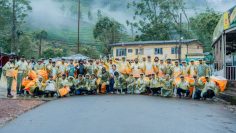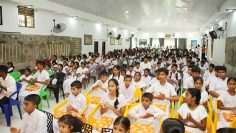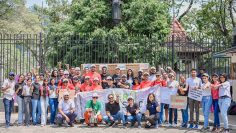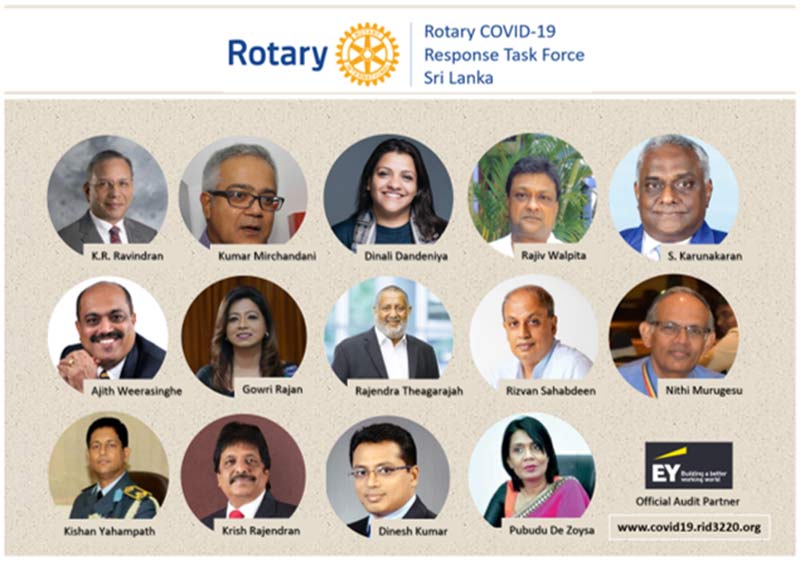
Rotary Sri Lanka supports the Ministry of Health to combat COVID-19
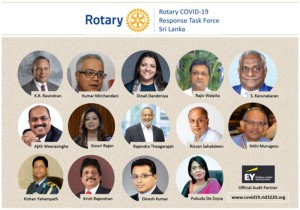
The world is now facing a global crisis, perhaps the biggest crisis of our generation. Thus far, there have been over 2.2 million positive cases of COVID -19 and 150,000 deaths. A few months ago, this was an unthinkable scenario. But today the coronavirus has upended our lives. The decisions people and governments make in the next few weeks will probably shape the world for years to come.
Rotary Sri Lanka is doing its part to combat the threat. At the initial stages of the outbreak, Rotary commenced a dialogue with the Ministry of Health, with which a decades-long relationship is maintained through extensive services. Rotary supported the ministry through printing of publicity material, upgrading the software and hardware in the health promotion bureau, shipping in digital thermometers from India, and joining them, the World Health Organization (WHO) and the Ceylon Chamber of Commerce in educating our corporate employees via webinars.
Rotarians are aware that they can contribute significantly during this public health crisis. “We could do so with the same spirit that was witnessed in our battle against polio and in the aftermath of the tsunami. We have thus embarked on a project, in partnership with the Ministry of Health, to support Sri Lanka’s foremost research lab – the Medical Research Institute (MRI) – which is at the forefront of COVID-19 diagnosis”, said Sebastian Karunakaran, District Governor for Sri Lanka & Maldives.
A special task force has been established for this purpose under the Chairmanship of Past Rotary International President K.R. Ravindran. Mr. Ravindran spearheaded several mega Rotary projects in Sri Lanka, including fighting against polio and rebuilding schools affected by the tsunami. Reputed corporate leaders and professionals in Rotary have volunteered to serve as members of the task force, and renowned audit firm EY has been appointed as the official auditor to ensure transparency.
“We are committed to help the MRI re-equip and modernize their equipment to carry out tests faster and more accurately. We will help them to be more agile and cater to more, eventually lifting it up to international standards in testing techniques,” further added by Mr. Karunakaran.
The main equipment required for the MRI is a fully-automated Nucleic Acid Extraction and PCR System with related peripherals and accessories. With this, the institute will be able to reduce the test time from around eight hours to just two hours, providing very accurate testing results. The speed will enable them to undertake many more tests within the same time period, essentially increasing capacity. It will also enable MRI to test safely as manual testing carries with it a high-risk exposure. This system is not available in Sri Lanka, not even in the private sector. The equipment can also be used beyond the COVID-19 crisis for other tests like CMV, BKV hepatitis B and C (16 other virus PCR) in transplant patients, pregnant women and newborn children.
“We not only help cater to superior testing techniques, but also help protect our healthcare workers,” said K.R. Ravindran, Chairman of the special task force committee. He further added, “We are also supporting the frontline workers around the country with personal protecting equipment (PPE), surgical masks, shoes, and many other things through over 70 Rotary clubs in the country”. The total project cost is estimated to be around LKR 150 million.
The project is supported by The Rotary Foundation, District Designated Funds (DDF) from Rotary Districts in Australia, Japan, USA, UK and Taiwan, and generous contributions by our own Rotary family and several reputed corporates, including Carson Cumberbatch PLC, NDB Bank and LBR Foundation, to name a few.
With the increased plea for help, Rotary has to renew the call for funds. This is an emergency as never seen before and those who would like to be a part of this project can visit https://covid19.rid3220.org for sponsorship and other details.
Rotary brings together a global network of volunteers dedicated to tackling the world’s most pressing humanitarian challenges. The organization connects 1.2 million members of more than 35,000 Rotary clubs in over 200 countries and regions. Their work improves lives at both the local and international levels, from helping families in need in their own communities to working toward a polio-free world.



